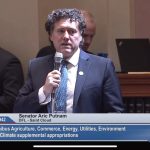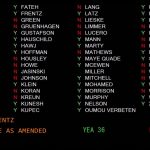Legislative Update: Senate approves ag package
Lawmakers are working long hours at the State Capitol and that pace isn’t expected to break through the end of the legislative session on Monday, May 20. Since last week’s update, we’ve seen renewed action on the MinnesotaCare Public Option, passage of the Senate agriculture omnibus package and approval by both bodies of a new veterinary technician licensure.
First a bit on process and timeline. Lawmakers have just 12 calendar days until the legislature is constitutionally required to adjourn on May 20, so they’re working hard to pass omnibus bills, reach deals in conference committees, and deliver supplemental policy and spending proposals to the governor’s desk. The Senate, for example, debated a transportation and labor package until 4 a.m. Tuesday, only to return by noon that day.
Why then is neither body meeting for session this Wednesday? That’s because they’re bound by another timeline that is even tighter—under Minnesota law, the legislature may only meet 120 days per biennium, leaving just seven days that the House and Senate can convene to pass bills this year. In other words, it’s crunch time.
Time is particularly tight because in many cases (probably most), bills need to be debated and voted on at least four times—by the House and Senate, and then after conference committee by both bodies again. One strategy the DFL majority has employed to expedite work is to bundle omnibus bills together.
This is true for the agriculture omnibus, which was combined with budgets for commerce and energy late last month (SF4942 / HF4975). You can read more about that in last week’s update. On Monday, the Senate approved this package on a near party line vote (36-30), sending the Senate file to the House.
 In debating the agricultural portions of the bill, Republicans were in broad agreement that Chair Aric Putnam’s, DFL-St. Cloud, proposal was a good one that would have enjoyed broad bipartisan support. In fact, agriculture minority lead Torrey Westrom, R-Elbow Lake, brought forward no amendments on behalf of his caucus, instead opting to complement Putnam on his bipartisan work in committee. You can read MFU’s full comments on the agriculture bill here.
In debating the agricultural portions of the bill, Republicans were in broad agreement that Chair Aric Putnam’s, DFL-St. Cloud, proposal was a good one that would have enjoyed broad bipartisan support. In fact, agriculture minority lead Torrey Westrom, R-Elbow Lake, brought forward no amendments on behalf of his caucus, instead opting to complement Putnam on his bipartisan work in committee. You can read MFU’s full comments on the agriculture bill here.
Importantly, the Senate’s agriculture policy bill (SF4225) is also expected to be considered as part of this full package.  It was passed by the full Senate on a broad bipartisan vote (58-9) on April 4. As we wrote about last month, the bill is largely uncontroversial, but includes a number of provisions MFU worked on this session including requiring MDA to establish a portal to report suspected violations of the corporate farm law, clarifying language barring confidentiality clauses in ag production and marketing contracts, updating grain licensing and improving rules around food sampling.
It was passed by the full Senate on a broad bipartisan vote (58-9) on April 4. As we wrote about last month, the bill is largely uncontroversial, but includes a number of provisions MFU worked on this session including requiring MDA to establish a portal to report suspected violations of the corporate farm law, clarifying language barring confidentiality clauses in ag production and marketing contracts, updating grain licensing and improving rules around food sampling.
MinnesotaCare Public Option
Another proposal that will now be part of the debate over the agriculture, commerce and energy joint omnibus is the MinnesotaCare Public Option. This is the healthcare proposal MFU has worked hard on for a number of years that would allow farmers and others to ‘buy-in’ to the affordable, comprehensive coverage provided to lower income Minnesotans through MinnesotaCare.
In short, the next steps in establishing this program were being advanced as part of Chair Melissa Wiklund’s, DFL-Bloomington, Health and Human Services omnibus before the Public Option was stripped out when Senator John Marty, DFL-Roseville, voted with Republicans on his Finance Committee to remove the proposal from the bill. Following that, House Majority Leader and Public Option author, Jamie Long, DFL-Minneapolis, led in adding the proposal onto the commerce portions of the joint ag, commerce and energy omnibus. This is because the next step in the process for the Public Option is to secure the necessary federal waiver and the Minnesota Department of Commerce is the agency that would lead on that waiver.
The entire package in the House is expected to come up for a vote Thursday, May 9.
Other priorities
On other priorities relevant to special orders, an omnibus bill carrying a new Veterinary Technician licensure passed both the House and Senate (HF4570), both with strong bipartisan votes (92-37; 66-0). You can read a summary of that proposal, led by Rep. John Huot, DFL-Rosemount, and Sen. Rob Kupec, DFL-Moorhead, here.
Last week, we wrote about the Senate Tax bill (SF5247), which includes a provision allowing small farms to benefit from the Ag Homestead Credit and an increase in funding for Soil and Water Conservation Districts (SWCDs). This proposal, led by Sen. Ann Rest, DFL-New Hope, passed the Senate with broad bipartisan support (55-10). In conference, it will meet the House’s proposal, which doesn’t include these provisions.
Also, in the Senate Chair Foung Hawj, DFL-St. Paul, led an amendment to restore funding to ag programs as part of his Clean Water Fund proposal, a move which earned votes from most Republicans (55-9). Both the House and Senate Legacy proposals now send:
- $4.4 million to the Department of Agriculture (MDA) for addressing nitrates in groundwater and boosting the Ag Best Management Practices (AgMBP) loan program.
- $3.2 million to the Department of Health (MDH) for addressing nitrates in groundwater and specifically responding to the EPA petition in southeast Minnesota.
- $2 million for the Pollution Control Agency (MPCA) for maintaining their continuous nitrate sensor network.
These largely align with the recommendations put forward by the Clean Water Council (CWC), which includes MFU Big Stone County President Peter Schwagerl.
This week, we received member questions about a provision that would remove the requirement that school boards post their meeting minutes in a local newspaper. Instead, under the proposal, they would have the option of posting these on their website. Member concerns include that not everyone—particularly in greater Minnesota—has access to internet, that schools wouldn’t need to maintain that archive and that transparency is good for everyone. This proposal is part of the education policy omnibus (SF3567), which is made up of lawmakers Reps. Laurie Pryor, DFL-Minnetonka, Josiah Hill, DFL-Stillwater, Peggy Bennet, R-Albert Lea, and Sens. Steve Cwodzinksi, DFL-Eden Prairie, Erin Maye Quade, DFL-Apple Valley, and Jim Abeler, R-Anoka.
Finally for the state level, work on a borrowing package for publicly owned infrastructure—or a bonding bill—still remains. Last week, the House Chair Rep. Fue Lee, DFL-Minneapolis, advanced his nearly $1 billion proposal through a final committee stop. You can see a list of projects here.
Farm bill overviews released
On the federal level, National Farmers Union (NFU) responded to the release of Farm Bill overviews, highlighting the need for continued bipartisan work.
“Family farmers need a farm bill that establishes a stronger farm safety net, builds fairer and more competitive markets and creates better opportunities for the next generation of farmers,” said NFU President Rob Larew. “We are encouraged to see yesterday’s progress and look forward to working with the committees as they forge ahead in the process.”
As always, if you have questions, thoughts, or concerns about MFU’s legislative work, reach out at (320) 232-3047 (C) or stu@mfu.org.
